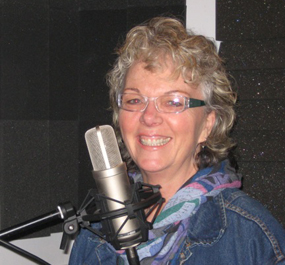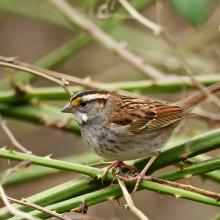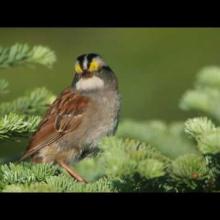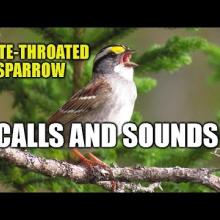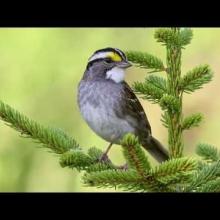

Join BirdNote tomorrow, November 30th!
Illustrator David Sibley and actor H. Jon Benjamin will face off in the bird illustration battle of the century during BirdNote's Year-end Celebration and Auction!
In late winter, White-throated Sparrows erupt into song, easily set to human words: “Old Sam Peabody, Peabody, Peabody.” Or “Oh, sweet Canada, Canada, Canada.” But something changed since those classic memory aids were coined. Sixty years later, the bird sings a simpler, shorter song. Bird song, like human language, changes. By the 1960s, the bird’s longer song became rare. Researchers suggested that the “classic” song had — for some unknown reason — died out, to be replaced by a shorter version.
This story was produced with support from the Bobolink Foundation.
BirdNote®
New Sam Peabody
Written by Rick Wright
This is BirdNote.
[White-throated Sparrow (15577) 00:07 and following]
White-throated Sparrows are shy birds, but on warm days in late winter and early spring, the spirit comes upon them and the thickets erupt into song. Those cheerful whistles are easily set to human words:
[White-throated Sparrow (15577) 00:07 and following]
“Old Sam Peabody, Peabody, Peabody.” Or “Oh, sweet Canada, Canada, Canada.”
But something has changed since those classic memory aids were coined. Listen to this recording, made in the early 1950s.
[White-throated Sparrow (15577) ) 00:07 and following]
This song begins with two long, pure notes —“Old Sam,” “Oh, sweet”— and concludes with three triplet groups.
[White-throated Sparrow (66742) 00:29 and following and 2:58]
Now listen to this, recorded sixty years later:
[White-throated Sparrow (205319) 00:14 and following]
Hear the difference? It is very subtle. This bird sings a simpler, shorter song, with an abbreviated ending. [White-throated Sparrow (205319) 00:14 and following]
Here’s the older song again: [66742) 00:29 and following and 2:58]
And the newer one: [205319) 00:14 and following]
In the 1920s, the White-throated Sparrow’s longer song was the most common. But bird song, like human language, changes. By the 1960s, it had become extremely rare. Researchers suggested that the “classic” song had died out, to be replaced by the shorter version.
[White-throated Sparrow (205319) 04:41 and following]
Listen, in city parks, suburban back yards, open woods, and see what the birds in your neighborhood are saying.
For BirdNote, I’m Mary McCann.
###
Bird sounds provided by The Macaulay Library of Natural Sounds at the Cornell Lab of Ornithology, Ithaca, New York. White-throated Sparrow [15577] by Arthur A. Allen; White-throated Sparrow [66742] by William W.H. Gunn; White-throated Sparrow [205319] by Laura C. Gooch.
BirdNote's theme music was composed and played by Nancy Rumbel and John Kessler.
Producer: John Kessler
Executive Producer: Sallie Bodie
© 2017 Tune In to Nature.org April 2017 / February 2023 Narrator: Mary McCann
ID# WTSP-01-2017-4-3 WTSP-01



